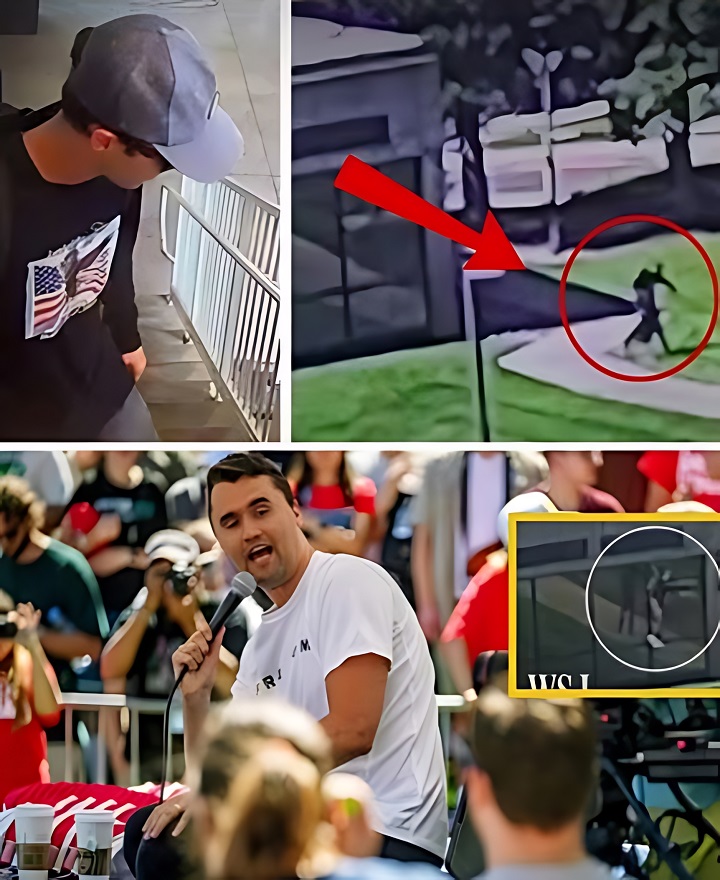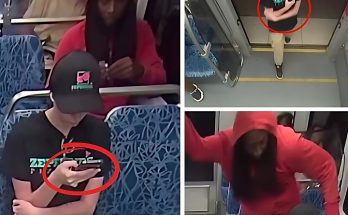In a nation already reeling from the brutal assassination of conservative firebrand Charlie Kirk, authorities have issued a stark, unprecedented warning to the public: “Think twice before viewing these images.” The 31-year-old founder of Turning Point USA, a powerhouse in right-wing youth activism and a close ally of President Donald Trump, was gunned down mid-speech at Utah Valley University on September 10, 2025. What began as a routine campus event turned into a national tragedy when a single, supersonic bullet struck him down from a rooftop perch, shattering the lives of his family, followers, and an entire political movement. Now, as the dust settles on the manhunt that gripped the country, the capture of 22-year-old suspect Tyler Robinson has peeled back layers of madness that even seasoned investigators describe as profoundly disturbing.
The shooting itself was a meticulously planned act of ideological fury. Kirk, known for his razor-sharp debates on everything from transgender rights to election integrity, was addressing a crowd of hundreds in Orem, Utah, when the fatal shot rang out. Eyewitnesses recall the chaos: screams echoing across the quad, students diving for cover, and Kirk collapsing at the podium, his final words—a passionate rant against “woke indoctrination”—cut short forever. Dispatch audio captured the frantic response: “Active shooter on the roof, black tactical gear, long gun sighted.” Within minutes, the campus was locked down, and a massive FBI-led operation swung into action, combing the misty autumn hills for any trace of the perpetrator.
The breakthrough came swiftly but not without its own brand of horror. Video footage released by the Utah Department of Public Safety showed the suspect—a lanky figure in dark clothing, a black backpack slung over one shoulder, and a tactical helmet obscuring his face—scrambling across the rooftop like a shadow come to life. He fired from a concealed position, then vaulted off the edge, leaving behind palm prints smudged on the ledge like a macabre signature. The rifle, a high-powered Mauser, was abandoned in a nearby wooded thicket, its stock etched with scrawled phrases that chilled investigators to the core: “Fascist hunter,” “End the hate machine,” and on an unfired bullet casing, the taunting “Hey, fascist, catch!” These weren’t random graffiti; they were a manifesto in miniature, a window into the fractured psyche of a young man consumed by rage.

Tyler’s arrest on September 12 was almost anticlimactic, facilitated not by high-tech surveillance but by a tip from a family friend who had seen the circulated photos. The 22-year-old, a third-year electrical apprenticeship student at Dixie Technical College in southern Utah, had been hiding out in a modest family home when the call came in. According to Utah Governor Spencer Cox, the friend reported that Robinson had “implied he committed the incident” during a late-night conversation, his voice laced with a mix of defiance and delusion. “He said Kirk was full of hate and spreading hate,” Cox recounted at a tense press conference, his face etched with exhaustion. Robinson was taken into custody without resistance, his eyes hollow as he was led away in handcuffs. Prosecutors wasted no time, filing charges of aggravated murder, felony discharge of a firearm causing serious bodily injury, and obstruction of justice, with the state vowing to pursue the death penalty.
But it was the contents of Robinson’s home that truly unleashed the nightmare. Police, executing a search warrant in the early hours of September 13, uncovered a trove of items that painted a portrait of unhinged obsession. The modest two-bedroom house in St. George, Utah—cluttered with circuit boards, half-assembled gadgets from his tech program, and faded posters of anti-fascist icons—held secrets far darker than a student’s dorm room. Scattered across the kitchen table were printouts of Kirk’s speeches, annotated with furious red ink: “Liar,” “Bigot,” “Must stop.” A laptop, left open and unlocked in haste, revealed browser histories delving into conspiracy forums, manifestos from past mass shooters, and endless loops of Kirk’s viral clips, paused on moments of his most inflammatory rhetoric.
Deeper into the house, the horror escalated. In a locked footlocker under his bed—pried open with bolt cutters—the investigators found what they’ve cryptically dubbed “the final images.” These weren’t innocuous snapshots; they were a digital scrapbook of delusion, comprising dozens of self-recorded videos and photos timestamped over the preceding months. Robinson, staring into his webcam with wild eyes and a unkempt beard, ranted for hours about “the fascist takeover,” weaving Kirk into a personal vendetta that blurred the lines between public figure and existential enemy. One clip, lasting over 20 minutes, showed him methodically cleaning the Mauser rifle while murmuring, “This is for the future we lost.” Accompanying the videos were Polaroids: blurred shots of Kirk at public events, taken from afar with a telephoto lens, and even a chilling mock-up of a “trophy wall” featuring Kirk’s face superimposed on historical villains.
The police warning, issued via a somber FBI bulletin late on September 12, underscores the visceral impact of these discoveries. “These materials depict extreme violence, graphic threats, and content that may cause significant psychological distress,” the statement read. “We advise the public, especially those unfamiliar with such imagery, to exercise caution before engaging with any leaked or shared files.” The advisory wasn’t hyperbole; early leaks on fringe social media platforms prompted reports of viewers experiencing panic attacks, with one anonymous tipster describing the footage as “like staring into the abyss of a serial killer’s mind.” Platforms like X and TikTok scrambled to scrub the content, but not before it spread like digital wildfire, fueling debates on free speech versus public safety in an era of ideological extremism.
What drove Tyler Robinson to this precipice? Born into a working-class family in rural Utah—ironically, a conservative stronghold—the young man showed early promise in STEM fields, earning scholarships for his electrical program. Classmates remember him as quiet, introspective, the type to tinker with drones in the corner of the lab rather than join post-class beers. But cracks appeared in his senior year of high school, when a family financial crisis coincided with his first exposure to online radicalism. Forums like Reddit’s r/Collapse and Discord servers dedicated to “anti-fascist resistance” became his echo chamber, where Kirk’s unapologetic conservatism was recast as the root of societal ills. “He started seeing enemies everywhere,” a former roommate told investigators off-record. “Charlie Kirk wasn’t just a pundit to him; he was the symbol of everything broken.”
Psychological profiles emerging from the investigation paint Robinson as a textbook case of “lone wolf” radicalization, amplified by the isolation of pandemic-era online life. Experts note parallels to cases like the 2019 El Paso shooter, whose manifesto railed against perceived cultural invaders. Here, the invader was ideological: Kirk’s relentless crusade against “leftist indoctrination” in schools, his viral takedowns of progressive policies, and his role in mobilizing young voters for Trump. Robinson’s videos obsess over a single Kirk tweet from 2024—”The radical left wants to erase America”—interpreting it as a personal call to arms. “He believed he was saving the world,” one profiler surmised, “by becoming the monster he feared.”
The ripple effects of this tragedy extend far beyond Utah’s borders. Turning Point USA, now led by Kirk’s widow Erika in an interim capacity, has vowed to press on, with events redoubled in his honor. “Charlie’s voice was silenced, but his fire burns brighter,” she declared at a candlelit vigil in Phoenix, where mourners laid flowers at the organization’s headquarters. President Trump, in a fiery Truth Social post, blamed “radical left scum” for fostering the rhetoric that birthed such violence, while international leaders from Italy’s Giorgia Meloni to Israel’s Benjamin Netanyahu offered condolences, framing the killing as an assault on global conservatism. Even California Governor Gavin Newsom, an unlikely ally after a podcast debate with Kirk earlier this year, decried the act as a “senseless reminder to reject political violence.”
As Robinson awaits arraignment, the nation grapples with uncomfortable truths. The items left behind—those damning images and artifacts—aren’t just evidence; they’re a mirror to our polarized age, where words can ignite bullets. Investigators continue to sift through the digital detritus, uncovering encrypted chats and burner phone logs that hint at a wider network, though for now, the portrait is of a solitary madman. The police’s cautionary plea lingers: In seeking to understand evil, we risk confronting its full, unfiltered horror. Charlie Kirk’s death has claimed one life, but the shadows it casts may haunt us all, urging a reckoning with the demons we unleash online and off. Will this be the catalyst for de-escalation, or just another chapter in America’s endless culture war? Only time, and perhaps the courts, will decide.



